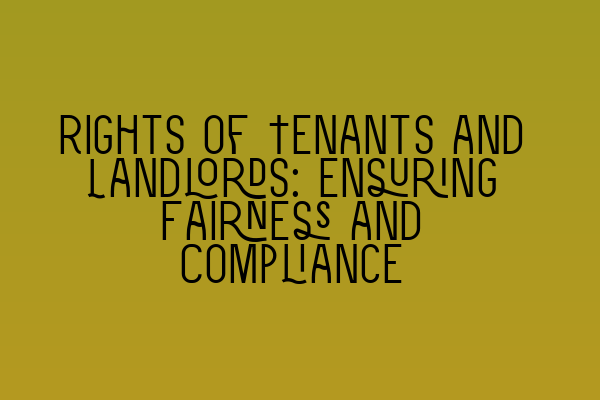Rights of Tenants and Landlords: Ensuring Fairness and Compliance
As a tenant or a landlord, it is crucial to have a clear understanding of your rights and obligations. This knowledge is essential for maintaining a fair and mutually beneficial relationship. Whether you are renting a property or leasing it out, familiarizing yourself with property law and land law regulations will help ensure compliance and protect your interests. In this blog post, we will explore some of the key rights and responsibilities of tenants and landlords.
1. The Right to a Tenancy Agreement:
A tenancy agreement is a legally binding contract between a tenant and a landlord. It outlines the terms and conditions of the tenancy, including the duration, rent amount, and responsibilities of both parties. As a tenant, make sure you thoroughly read and understand the agreement before signing it. If there are any clauses or terms that seem unclear or unfair, consider seeking legal advice to ensure your rights are adequately protected.
2. Maintenance and Repairs:
Both tenants and landlords have responsibilities when it comes to property maintenance and repairs. Landlords are generally responsible for ensuring the property is safe and habitable, including maintaining essential facilities such as water, heating, and electricity. Tenants, on the other hand, are responsible for reporting any maintenance issues promptly and should also take reasonable care to prevent damage to the property. Understanding these obligations will help maintain a harmonious tenancy and avoid potential disputes.
3. Security of Tenure:
In many jurisdictions, tenants have a right to security of tenure. This means that as long as they comply with the terms of the tenancy agreement and pay rent on time, they have the right to remain in the property for the agreed-upon duration. Landlords cannot evict tenants without proper legal grounds or following the required eviction procedures. It is important for tenants to be aware of their rights and seek legal advice if faced with a potential eviction without valid reasons.
4. Rent and Deposit Protection:
Rent and deposit protection is a crucial aspect of tenant-landlord relationships. Both parties should understand the rules and regulations regarding rent increases, rent payment methods, and the protection and return of the deposit. As a tenant, ensure that your deposit is placed in a government-approved tenancy deposit protection scheme. This provides you with protection against unfair deductions and ensures the deposit is returned promptly at the end of the tenancy, as long as there are no damages or unpaid rent.
5. Right to Quiet Enjoyment:
Tenants have the right to quiet enjoyment of the property they are renting. This means they have the right to live in the property without unnecessary disturbance or interference from the landlord. Landlords should respect this right and provide proper notice and justification if they need to access the property for inspections or repairs. Tenants should also be considerate of their neighbors and keep noise levels within reasonable limits.
In conclusion, understanding the rights and responsibilities of tenants and landlords is crucial for maintaining fairness and compliance in the rental market. By familiarizing yourself with the relevant property law and land law regulations, you can ensure that your rights are protected and your obligations are met. If you have any doubts or concerns, do not hesitate to seek legal advice from a professional solicitor specializing in property law. Remember, a well-informed tenant-landlord relationship is the foundation for a positive and mutually beneficial renting experience.
